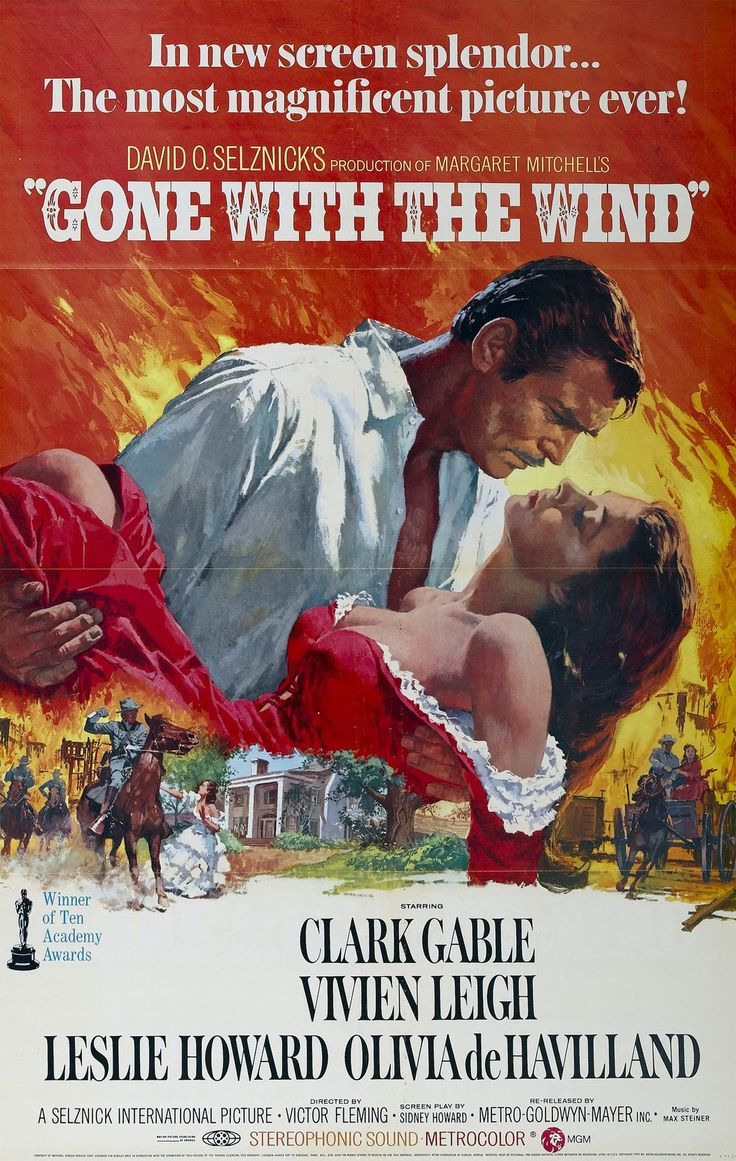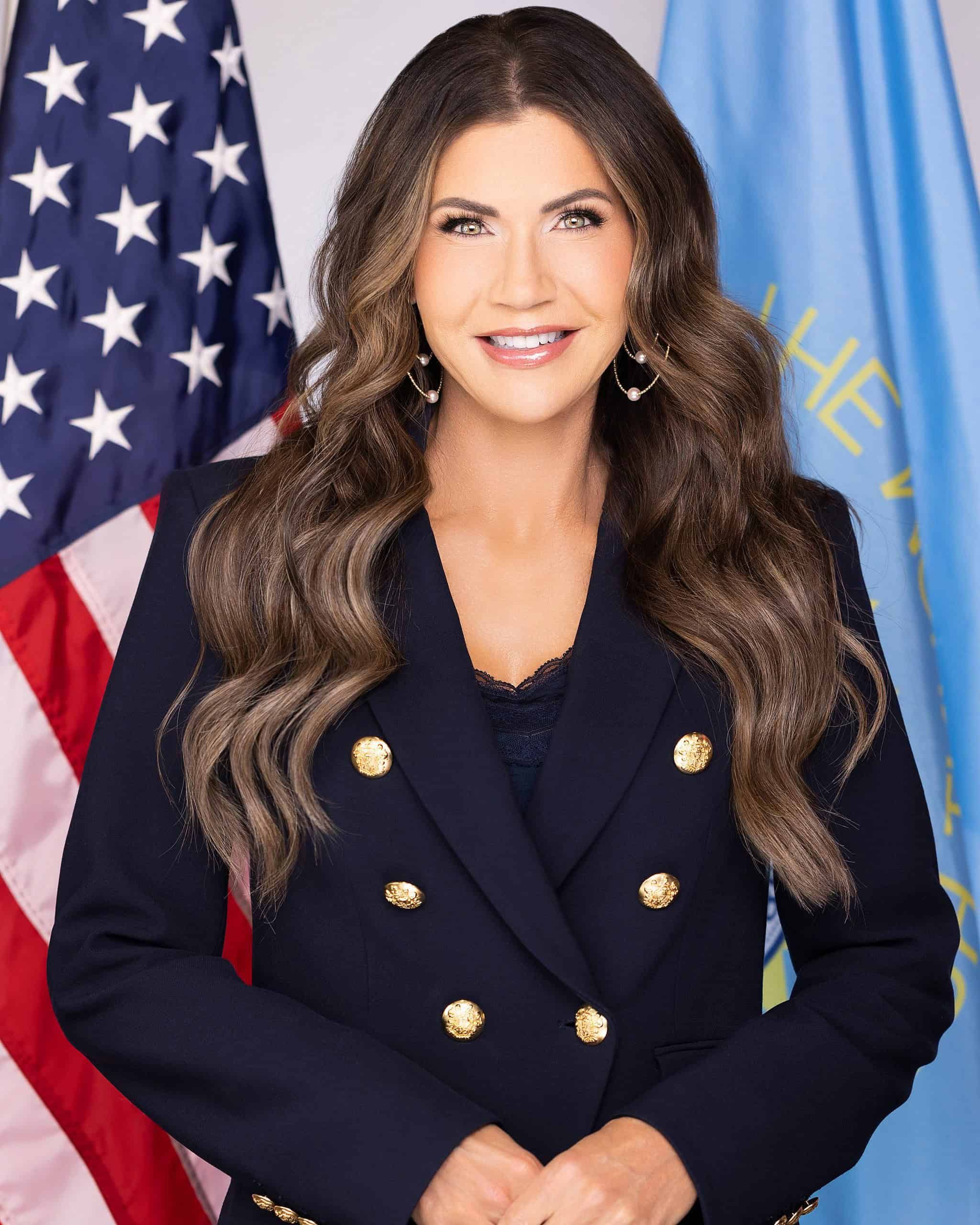
The political trajectory of Kristi Lynn Arnold Noem, born on November 30, 1971, in Watertown, South Dakota, culminates in her recent confirmation in January 2025 as the 8th United States Secretary of Homeland Security. A prominent figure within the Republican Party, Noem’s ascent to this pivotal cabinet role follows a distinguished career marked by her service as the 33rd governor of South Dakota from 2019 to 2025 and as a U.S. representative for South Dakota’s at-large congressional district from 2011 to 2019.
Her journey through American politics began modestly within her home state, reflecting a deep connection to its heartland roots. Raised on a family ranch and farm in Hazel, South Dakota, Noem graduated from Hamlin High School in Hayti in 1990. A significant turning point in her early life occurred in March 1994 when her father was killed in a grain bin accident, prompting her to leave Northern State University prematurely to manage the family farm. She expanded the family property by adding a hunting lodge and restaurant, with her siblings also returning to assist in these business endeavors.
Despite her early departure from university, Noem later pursued her education while actively engaged in public service. She took classes at the Watertown campus of Mount Marty College, South Dakota State University, and online from the University of South Dakota. Notably, she obtained a Bachelor of Arts degree with a major in political science from South Dakota State University in 2012, all while serving as a U.S. representative. The Washington Post even referred to her as Capitol Hill’s “most powerful intern” for receiving college intern credits from her congressional position.
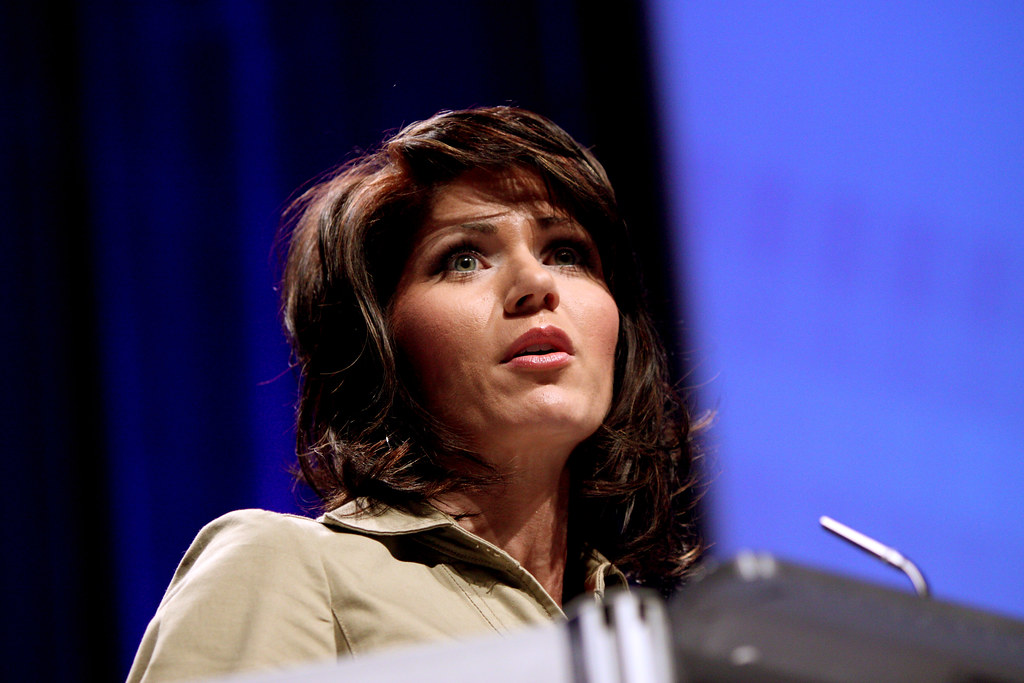
Noem embarked on her political career in 2006, securing a seat as a Republican in the South Dakota House of Representatives for the 6th district. She served for four years, from 2007 to 2010, and held the position of assistant majority leader during her second term. During this period, Noem was the prime sponsor of eleven bills that ultimately became law, including several property tax reforms and two bills aimed at increasing gun rights within South Dakota. Her involvement extended to serving as vice chair of the Agriculture Land Assessment Advisory Task Force in 2009, a body chaired by Senator Larry Rhoden, who would later become her lieutenant governor. Demonstrating a multifaceted commitment to public service, she also joined the Civil Air Patrol as a “state legislative member,” where she now holds the rank of lieutenant colonel.
In 2010, Noem successfully ran for South Dakota’s at-large seat in the U.S. House of Representatives, defeating incumbent Democrat Stephanie Herseth Sandlin in the general election after winning the Republican primary. She was subsequently reelected three times, serving in Congress until 2019. Her arrival in Washington was notable, as the 2011 House Republican 87-member freshman class elected her as liaison to the House Republican leadership. This made her the second woman member of the House GOP leadership, tasked with advocating for significant cuts to federal government spending and assisting Speaker John Boehner in managing the expectations of the freshman class.
Throughout her tenure in the U.S. House, Noem staked out clear conservative positions on a range of national issues. On the deeply divisive issue of abortion, she consistently co-sponsored legislation that sought a federal ban. In 2015, she supported a bill to amend the 14th Amendment to define human life and personhood as beginning at fertilization, effectively proposing a federal ban from that moment. She also voted in favor of a bill to ban abortion after 20 weeks of pregnancy, aligning herself firmly with the anti-abortion movement.
Concerning energy and the environment, Noem expressed skepticism regarding the scientific consensus on climate change. In 2022, she publicly stated that she believes the science has been varied on it, and it has not been proven to her that what is being done is affecting the climate. She advocated for an “all-of-the-above energy approach” for the U.S., embracing renewables like wind and ethanol while emphasizing the need for a “balanced energy mix” to reduce American reliance on foreign oil. Her support extended to the Keystone XL Pipeline and offshore oil drilling, and she co-sponsored bills aimed at ending the 2010 deepwater drilling moratorium in the Gulf of Mexico and reopening oil lease sales.
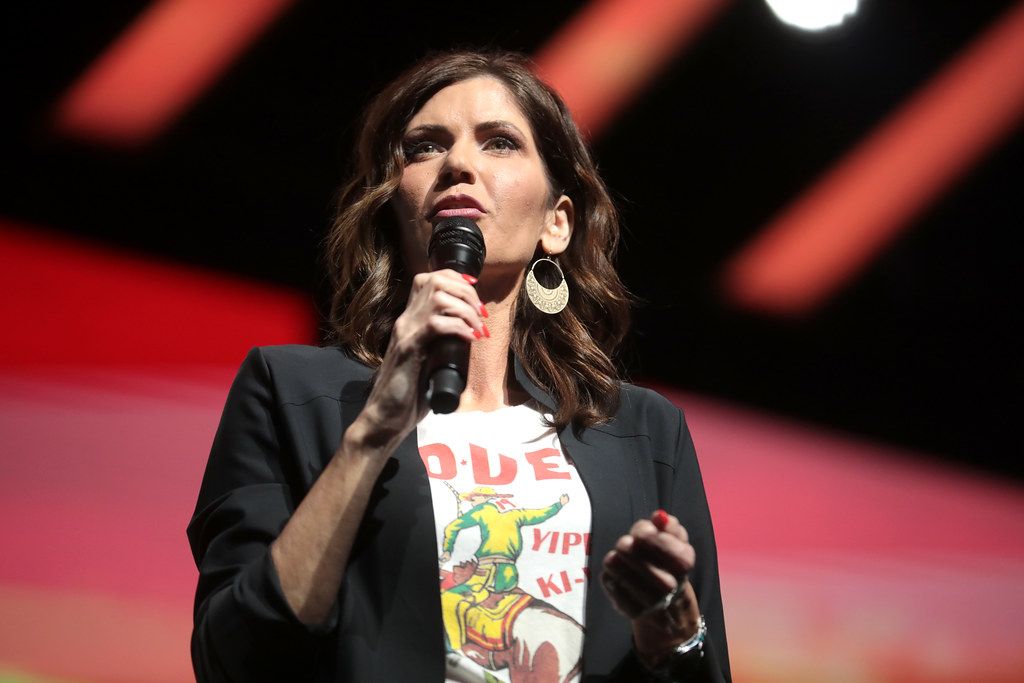
In a move that highlighted her stance against federal environmental regulations, Noem sponsored a measure in 2011 to block Environmental Protection Agency funding for tighter air pollution standards for coarse particulates. She also opposed a bill from South Dakota Senator Tim Johnson that sought to designate over 48,000 acres of the Buffalo Gap National Grassland as protected wilderness. Noem argued that the land was already managed as roadless areas similar to wilderness and changing its designation would further limit leaseholder access and imperil grazing rights, instead supporting its designation as a national grassland.
Within foreign affairs, Noem served on the House Armed Services Committee from 2013 to 2015, where she contributed to the 2014 National Defense Authorization Act. Her appointment to this committee was perceived as beneficial to South Dakota’s Ellsworth Air Force Base. In March 2011, she voiced criticism of President Barack Obama’s strategy concerning the NATO-led military intervention in the 2011 Libyan civil war, calling for more clarity on the U.S. role and characterizing his statements as vague and ambiguous.
On healthcare, Noem was a vocal opponent of the Affordable Care Act, commonly known as Obamacare, and voted to repeal it. After unsuccessful attempts to repeal the law, she aimed to defund it while retaining popular provisions such as the Indian Health Care Improvement Act, the allowance for parents to keep children on their health insurance into their twenties, and high-risk pools. She advocated for federal legal additions like limits on medical malpractice lawsuits and enabling patients to purchase health insurance plans across state lines. Furthermore, she supported cuts to Medicaid funding proposed by Republican Budget Committee chairman Paul Ryan, a move a study indicated would reduce benefits for South Dakota Medicaid recipients by 55 percent.
Her positions on immigrants and refugees aligned with the stricter policies pursued by the Trump administration. Noem supported President Donald Trump’s 2017 Executive Order 13769, which temporarily suspended the U.S. refugee program for 120 days and banned travel from seven Muslim-majority countries for 90 days. She expressed support for a temporary ban on accepting refugees from “terrorist-held” areas. In 2019, Noem consented to South Dakota’s participation in the U.S. Refugee Resettlement Program, following a Trump executive order that granted state and local governments the option to opt out. This stance on immigration and border security would become a recurring theme in her political career.
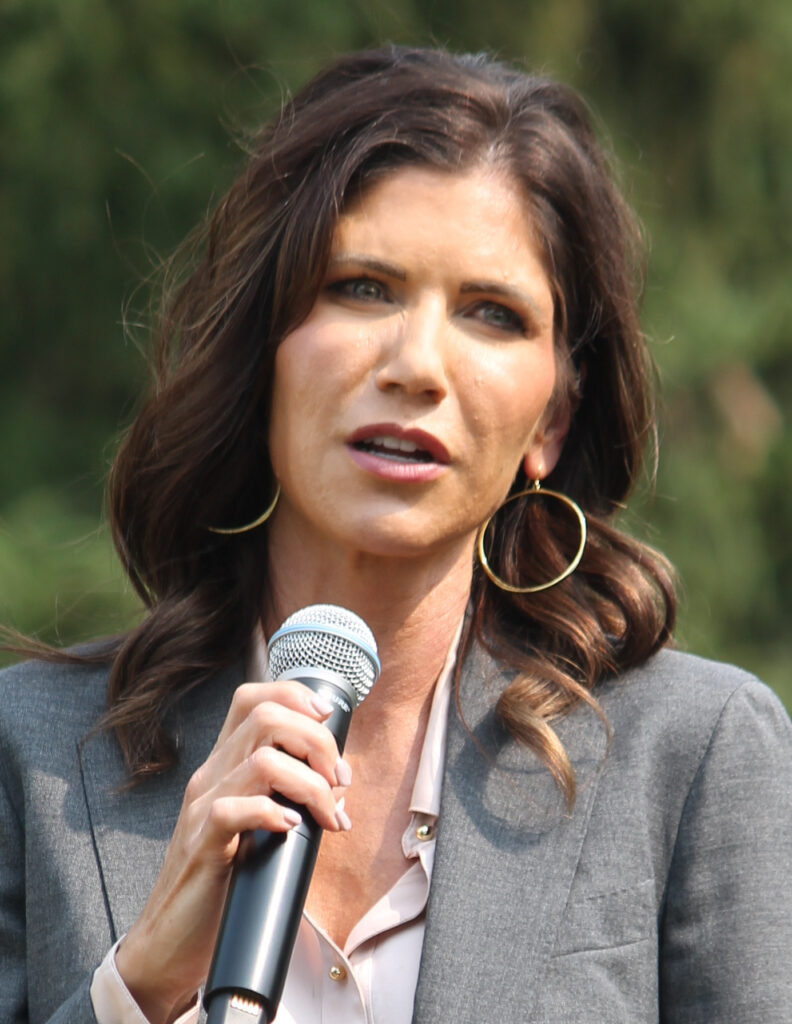
Noem’s legislative efforts also touched upon in-vitro fertilization and embryonic stem-cell research. In August 2010, while campaigning for Congress, she indicated in a questionnaire from the Christian Coalition voter guide that she would vote to ban embryonic stem-cell research. In 2015, she co-sponsored legislation to amend the 14th Amendment to define human life and personhood as beginning at the moment of fertilization, explicitly without exceptions for in-vitro fertilization or embryonic stem-cell research.
Regarding taxes, Noem played a significant role in the passage of the Tax Cuts and Jobs Act in 2017 as a member of the conference committee. She publicly touted the act, stating it would provide the average South Dakota family with a $1,200 tax cut. In 2018, she proposed attaching her online sales tax bill to the government funding package as part of an omnibus, citing a South Dakota Supreme Court case that involved requiring certain out-of-state retailers to collect state sales taxes. Noem argued that South Dakota businesses, and by extension businesses nationwide, could be forced to comply with 1,000 different tax structures nationwide without the necessary tools, adding that her legislation provides a necessary fix.
Identifying the budget deficit as a critical issue facing Congress, Noem co-sponsored H. J. Res. 2, a measure that would mandate that total spending for any fiscal year not exceed total receipts. She identified various federal programs for potential cuts, including the Environmental Protection Agency, the Department of Veterans Affairs, Medicaid, high-speed rail projects, cap-and-trade technical assistance, and subsidies for the Washington Metro rapid transit system. In 2011, she indicated she would vote to raise the federal debt ceiling only if tied to budget reforms that change the way dollars are spent and how Washington, D.C., conducts business, emphasizing it would not be a one-time spending cut. She ultimately voted for S. 365, The Budget Control Act of 2011, which allowed President Obama to raise the debt ceiling in exchange for spending cuts determined by a bipartisan committee. Additionally, Noem expressed desires to eliminate the estate tax, lower the corporate tax rate, and simplify the tax code, stating she would not raise taxes to balance the budget.
Upon her election as the first female governor of South Dakota in 2018, Noem continued to pursue a distinctly conservative agenda, often bringing her into the national spotlight. Her victory in 2018 with President Donald Trump’s endorsement, followed by a decisive reelection in 2022, solidified her political influence within the state and nationally. As governor, her positions on issues remained firm, often reinforcing her reputation as a staunch conservative.
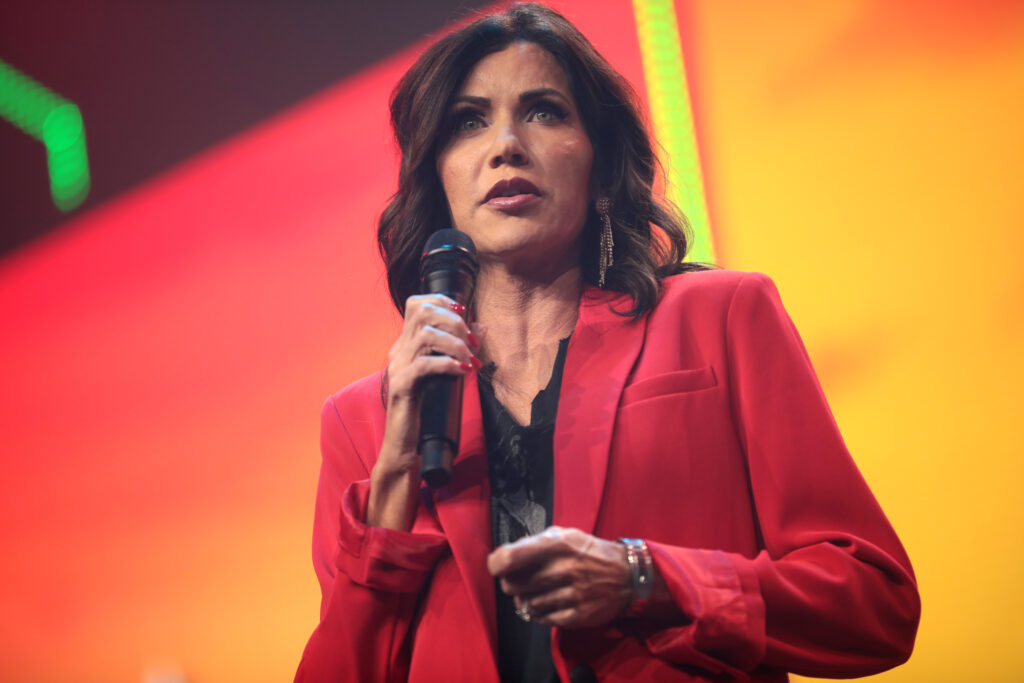
On abortion, Noem maintained her steadfast anti-abortion stance, being lauded by groups like Susan B. Anthony List and stating her intention to uphold a 100% anti-abortion voting record. Following the overturning of Roe v. Wade, South Dakota became one of the first states to enact trigger laws banning abortions. Noem defended the state’s ban, which permits exceptions only when the mother’s life is in danger, and explicitly stated she would not support changes to allow exceptions for rape victims, explaining that she did not believe a tragic situation should be perpetuated by another tragedy. In 2024, she proclaimed the year “Freedom for Life Year,” promoting anti-abortion laws, though she later reversed her support for a federal ban, asserting that abortion law should be determined at the state level while continuing to support South Dakota’s law.
In the realm of early childhood education, Noem emerged as a vocal opponent of subsidized child care. Her administration rejected $7.5 million in federal funds for free summer meal programs for low-income residents and defeated multiple attempts to provide school lunches for eligible students. In 2023, Noem articulated her philosophy, stating, “I just don’t think it’s the government’s job to pay or to raise people’s children for them.
Noem’s tenure as governor also faced scrutiny regarding government transparency, despite her 2018 campaign pledge to work toward building “the most transparent administration South Dakota has ever seen.” News outlets and government transparency advocates initiated lawsuits against her administration for alleged failures to provide promised transparency. Complaints ranged from denied immediate access to a state-funded report on critical race theory in schools and a lack of access to pardon records, to the non-disclosure of the cost of the governor’s security team. Her administration also faced accusations of whipping votes against a bill designed to make the cost of governor’s security public records and attempts to seal records related to an ethics investigation involving her daughter.
One significant controversy revolved around a conflict of interest action perceived to professionally benefit her daughter, Kassidy Peters. In 2020, after Peters, then 26, was denied a real estate appraisal license, Noem summoned Sherry Bren, a state employee who had directed South Dakota’s Appraiser Certification Program for 30 years, to her office. The meeting included Peters, Noem’s chief of staff, the Department of Labor attorney, and the Labor Secretary. A week later, Bren was asked to resign and later received a $200,000 settlement as part of a nondisclosure agreement, withdrawing her age discrimination complaint and leaving her position. Noem’s spokesperson characterized the allegations as an example of how Noem cut through “bureaucratic red tape.”
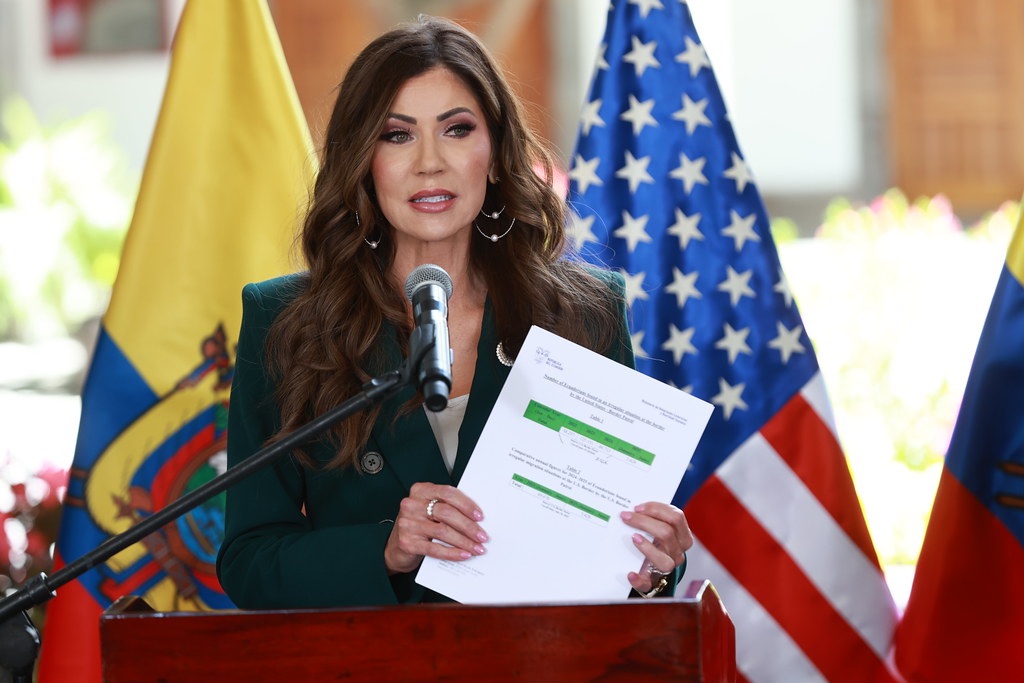
The incident prompted an investigation by the State Senate’s Government Operations and Audit Committee. Bren testified before the committee, stating she felt “very nervous” and “intimidated” during the meeting with Noem and state officials. She recounted that the decision to offer a third opportunity for her daughter to meet licensing requirements, deviating from recognized upgrade procedures, was “not normal.” The Government Accountability Board later referred two complaints regarding the matter to Noem for a response, and a Republican State Representative introduced a resolution addressing the governor’s actions, which ultimately failed.
Noem’s administration also pursued controversial anti-protest legislation, developed in collaboration with the energy company TransCanada Corporation in response to protests against the Keystone Pipeline. Signed into law in 2019, one measure created a fund to cover pipeline protest policing costs, while another aimed to generate revenue for this fund by establishing civil penalties for advising, directing, or encouraging participation in rioting. These laws were challenged in lawsuits by groups including the Indigenous Environmental Network and Sierra Club, who argued they violated First Amendment rights by incentivizing the state to sue protesters. A federal court struck down sections of the legislation as unconstitutional, leading Noem to bring forth new legislation to repeal sections and clarify the definition of “incitement to riot.” As a result of these laws, the Pine Ridge Indian Reservation banned Noem from their grounds, an early sign of a broader conflict with Native American tribes.
In 2024, it was widely reported that all nine tribes of South Dakota had banned Noem from entering their tribal lands, collectively prohibiting her from accessing nearly 20% of the state. This action followed demands for her to apologize for comments made in January 2024, where she described an “invasion” over the southern U.S. border and asserted that “the enemy is the Mexican drug cartels,” which she claimed were “perpetrating violence in each of our states, even here in South Dakota … The cartels are using our reservations to facilitate the spread of drugs throughout the Midwest.” In March 2024, she further alleged that “some tribal leaders … are personally benefiting from the cartels being there,” without providing evidence, and remarked that people living in those situations called her for help, stating they “live with 80% to 90% unemployment. Their kids don’t have any hope. They don’t have parents who show up and help them.” Around January 2025, Noem apologized to the tribes for the misunderstanding, leading the Flandreau Santee Sioux tribe to dissolve its ban and express support for her nomination as Secretary of Homeland Security, noting her commitment to protecting all South Dakota citizens, including tribal nations.
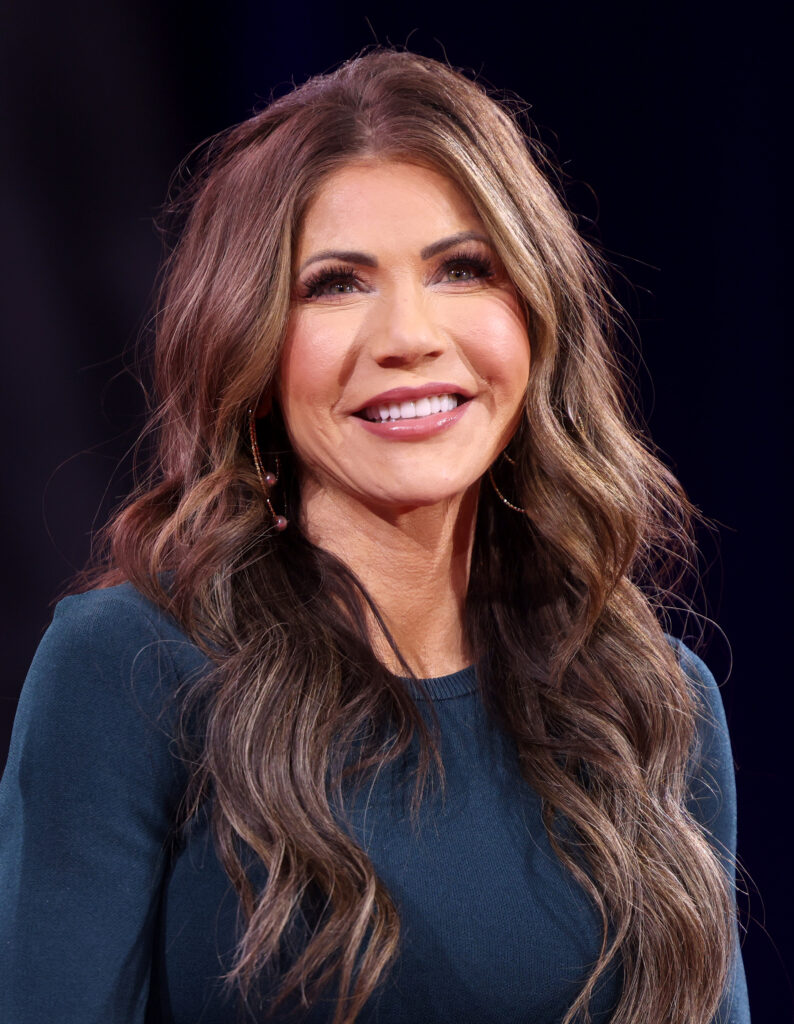
Her response to the COVID-19 pandemic during her governorship also garnered national attention and controversy. Initially open to containment strategies in early 2020, Noem gradually shifted to a hands-off approach. She notably did not implement statewide mask mandates, expressed doubts about the efficacy of mask-wearing, and encouraged large gatherings without social distancing or masks, questioning public health experts‘ advice. Her approach mirrored the rhetoric and handling of COVID-19 by President Trump, which elevated her national profile, including a speech at the August 2020 Republican National Convention.
Despite warnings from experts, Noem supported the annual Sturgis Motorcycle Rally in August 2020, an event attended by nearly 500,000 bikers. This decision was followed by a significant increase in COVID-19 cases in South Dakota, with dozens of cases linked to the event reported across several states. In November 2020, during a surge in cases, Noem controversially used pandemic relief funds to promote tourism, including $819,000 for a 30-second Fox News commercial she narrated during the 2020 Republican National Convention. By October 2020, South Dakota reported the country’s second-highest number of new COVID-19 cases per capita, and hospitals began prioritizing severe cases. Noem attributed the higher case numbers to increased testing, despite rising positive test and hospitalization rates. She publicly doubted scientific recommendations on masks, citing analysis by the Association of American Physicians and Surgeons, a group known for promoting pseudoscience. In February 2021, she signed a bill limiting civil liability for certain COVID-19 exposures, largely exempting healthcare providers and businesses unless gross negligence or willful misconduct was involved. She also opposed bills that would prohibit schools from requiring student vaccinations and legislation that would prohibit businesses from requiring vaccinations as a condition for employment, stating that requiring proof of vaccination to access government services was “un-American.
A major early outbreak occurred at the Smithfield Foods production plant in Sioux Falls, with nearly 1,300 workers and their family members testing positive and four deaths. Noem was among the first officeholders to publicly suggest that the contagion was spreading due to workers’ “home and social” habits, rather than within the facility. She told Fox News that she believed 99 percent of what was happening today was not happening inside the facility. At the time, USDA food-safety inspectors were not provided protective equipment and were initially forbidden from wearing masks in slaughterhouses. Noem’s administration also declined to opt into a federal program providing enhanced weekly unemployment benefits of $300, making South Dakota the only state to refuse the assistance, citing a low state unemployment rate despite it being higher than pre-pandemic levels.
Further controversies during her governorship included a significant shake-up within the Department of Corrections in July 2021. Noem placed Secretary Mike Liedholt on administrative leave and fired the State Penitentiary Warden and Deputy Warden following anonymous complaints regarding pay, medical coverage, and sexual harassment. The mask mandate at the prison was also ended despite lingering COVID-19 cases. The former director of the prison work program later filed a lawsuit alleging retaliation for reporting sexual harassment. In 2021, Noem also initiated a lawsuit against U.S. Secretary of the Interior Deb Haaland to allow fireworks at Mount Rushmore for Independence Day, a practice halted in 2009 due to fire risks. She hired a private Washington D.C. law firm, funded by South Dakota state taxpayer money, for the case. The U.S. District Court dismissed the suit, and the National Park Service again denied her permit application in 2022, citing opposition from Native American groups and wildfire concerns.
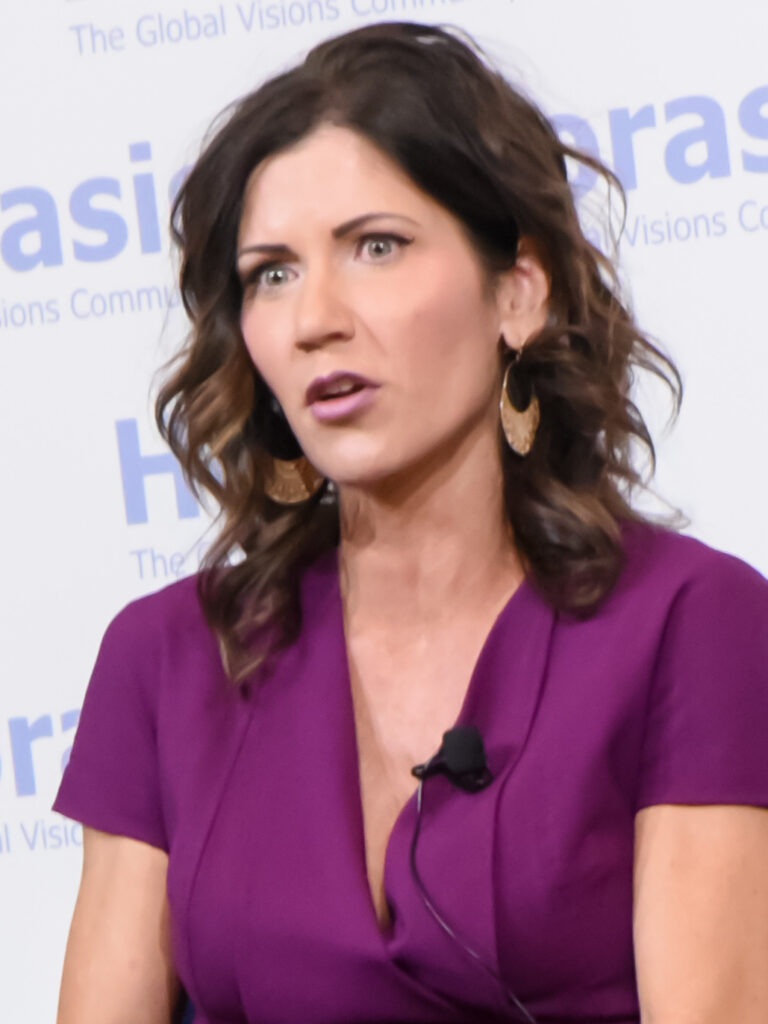
On the issue of gun rights, Noem signed a bill into law in 2019 that abolished South Dakota’s permit requirement to carry a concealed handgun. In 2022, her attempt to use government funds to build a gun range in Meade County was rejected by the legislature. At a 2023 NRA forum in Indiana, Noem notably stated that her two-year-old granddaughter owned a shotgun, a rifle, and a “little pony named Sparkles,” illustrating her strong pro-gun stance.
Her positions on LGBTQ rights also generated debate. Noem opposed same-sex marriage and in 2015, she stated her disagreement with Obergefell v. Hodges, the Supreme Court’s ruling that same-sex marriage bans are unconstitutional. In March 2021, she announced her intention to sign H.B. 1217, the Women’s Fairness in Sports Bill, which bans transgender athletes from playing on or against women’s school and college sports teams. Despite announcing her intent to sign, she issued a “style and form veto” that substantially altered the bill, prompting criticism from some conservative commentators. The South Dakota House rejected her veto, but ultimately failed to override her subsequent full veto, demonstrating the contentious nature of this issue within her state.
Perhaps one of the most direct precursors to her current role as Secretary of Homeland Security was her decision in June 2021 to deploy members of the South Dakota National Guard to Texas’s border with Mexico. This deployment was notably funded by a donation from Tennessee billionaire Willis Johnson. The use of privately donated funds for a National Guard deployment sparked controversy, leading the Center for Public Integrity to sue the South Dakota National Guard and the U.S. Department of Defense for documents related to the deployment and donation. Subsequently, the 2022 National Defense Authorization Act banned National Guard members from crossing state borders to perform duties paid for by private donors, reflecting the broader national debate on border security and funding mechanisms.

Now, as the Secretary of Homeland Security, Kristi Noem assumes a critical role overseeing a vast department responsible for border security, immigration enforcement, cybersecurity, and disaster response. Her extensive experience as a farmer and rancher, coupled with her legislative and executive leadership, brings a distinctive perspective to the federal government. Her past policy decisions, including her firm stance on immigration and her views on national security, suggest a continued emphasis on robust border enforcement and a skeptical approach to federal mandates.
Noem’s journey, from managing a family farm in rural South Dakota to ascending to one of the most challenging cabinet positions, underscores a career defined by unwavering conservative principles and a willingness to challenge prevailing norms. Her record as governor and congresswoman showcases a leader unafraid to pursue policies that align with her deeply held beliefs, even when met with legal challenges or public controversy. As she navigates the complexities of national security and immigration in her new federal capacity, her past actions and stated philosophies will undoubtedly continue to shape her approach to the critical issues facing the nation’s homeland security.
Her political life has been characterized by a blend of grassroots engagement and high-profile national debates, reflecting her journey from the South Dakota House to the U.S. Congress, and ultimately to the federal cabinet. Whether through her fiscal conservatism, her defense of gun rights, or her approach to public health and border security, Noem has consistently carved out a distinct and impactful presence in the American political landscape. Her new role as Secretary of Homeland Security stands as a testament to her enduring influence and the evolution of her policy focus on critical national issues.



